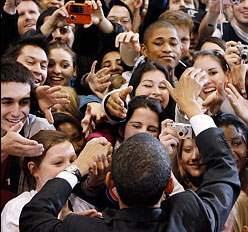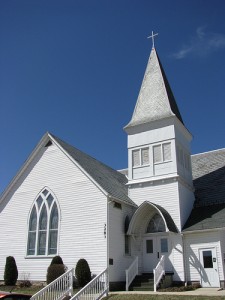Millennials

In a previous post about the recent ‘Millennial Values Survey,’ I pointed out that young millennials age 18-24 are becoming disillusioned with institutionalized religion.
It’s an anecdotal truth we’ve been throwing around quite a lot lately, but the survey proves the very clear reality that the newest generation of adults is checking the “unaffiliated” box at a rate of one in four.
But young adults aren’t just showing apathy for religion—it’s politics as well.
College-aged adults are not letting their moral beliefs on social issues filter into their politics.
According to the just released “Millennial Values Survey” by the Public Religion Research Institute and Berkley Center for Religion, Peace and World Affairs at Georgetown University, adults age 18-24 are much less likely than their parents to cite social issues like abortion (22 percent) or same-sex marriage (22 percent) as critical.
While the group is split on social issues personally, it doesn’t factor into its political reality. For example, while 51 percent believe abortion is morally wrong, 59 percent believe access to abortion should be legal. Likewise, 48 percent believe sex between members of the same gender is morally wrong, but 59 percent favor allowing same-sex couples to legally marry.
The gap is also evident in their religious affiliation. The percent of religiously unaffiliated jumped from 11 percent in childhood to 25 percent now.
Their attitudes toward Christianity paint a picture of possible motives behind the shift. Two-thirds say that Christianity can be described as “anti-gay,” and 62 percent believe present-day Christianity is “judgmental.”
The full survey will be released this morning at Georgetown University. Check back with Sojourners for more coverage of the findings.
Sandi Villarreal is Associate Web Editor for Sojourners. Follow Sandi on Twitter @Sandi.
Gabe Lyons thinks Christian culture warriors are on the wrong path.
His sixth annual Q Conference, which opens today in Washington, D.C., is an attempt to do things differently. With 700 participants gathered in a stately downtown auditorium, Lyons will play host to a distinct kind of Christian conference, one that seeks a respectful, constructive conversation on a host of issues confronting the nation.
Q, which stands for “question,” will allow 30 different culture leaders — from New York Times columnist David Brooks to Florida megachurch pastor Joel Hunter — to present their ideas for the common good during a two-and-a-half day confab.
“We feel we have a role to play in renewing the culture and holding back the effects of sin,” said Lyons, founder of Q, a nonprofit organization based in New York City. “We’re not to do it in an antagonistic way. We hope to do it in a hopeful way that gives witness to the rest of the world in how things ought to be.”

I’ve written a couple of pieces recently that have gotten a lot of attention about why younger people tend to walk away from church.
If you haven’t seen them yet, here are the links:
Seven Reasons Why Young Adults Quit Church
Four More (BIG) Reasons Why Young Adults Quit Church
Some readers suggested I might also post a piece about why young adults come back to church. Though I can’t say for sure why ALL young adults in church do so, I can share a few reasons why I, as a young adult, returned to church after an absence of ten years.

From time to time I revisit the question: Why are young adults walking away from religion?
Although the answer(s) vary from person to person, there are some general trends that I think apply in most cases. (In the list below, when I refer to “we,” “I” or “me,” I’m referring to younger adults in general, and not necessarily myself.)

Christianity in America is in danger. As former Senator Rick Santorum recently pointed out, young people are leaving the church in droves.
In the mid-1980s, evangelical 20-somethings outnumbered those with no religious affiliation — the so-called “nones” — by a ratio of more than 2 to 1. By 2008, those proportions were almost flipped, with young “nones” outnumbering evangelicals by more than 1.5 to 1.
An entire generation, my generation, is leaving the church. What’s the cause? Santorum blames higher education, telling Glenn Beck last week that "62 percent of kids who go into college with a faith commitment leave without it."
The “war on religion” has become a frequent bogeyman among Christian and political leaders. But the reason church leaders have failed to stem the tide of a generation heading for the exit door is that they keep looking for an outside enemy to blame when the biggest problems are inside the church.
The years young adults spend in college aren’t causing them to leave their faith; those college years are exposing the problems with the faith they grew up with.
The exodus has little to do with liberal college professors, which insurance plans should cover contraception, where mosques are being built, or whether or not the Ten Commandments are hanging in courtrooms, even if many religious leaders act as if these are the greatest Christian “battles” of our lifetime.

A fascinating new study by the Public Religion Research Institute found that two-thirds of all Americans identify with both the "pro-life" and "pro-choice" labels simultaneously.
The PRRI reports that 7-in-10 Americans say the term “pro-choice” describes them "somewhat" or "very well," and nearly two-thirds simultaneously say the term “pro-life” describes them "somewhat" or "very well."
"This overlapping identity is present in virtually every demographic group," the report said.
In one of the largest public opinoin surveys ever conducted on the subject of abortion and religion, PRRI's study, "Millennials, Abortion and Religion Survey," uncovered "large generational differences on two issues that have often been linked in political discourse: abortion and same-sex marriage."
According to the survey, Americans ages 18-29 (a.k.a., "Millennials") strongly support legal access to abortion services in their local communities despite being conflicted about the morality of abortion itself.

Are you a Christian who spends a lot of time online? Then perhaps you've heard of Jeff Bethke. Bethke, aka bball1989, is a spoken word poet whose rhymes and videos are capturing the attention of thousands of Christians across the web.
His latest video is going viral among online Christian communities. Provocatively titled “Why I Hate Religion, But Love Jesus,” the poem is a unique fusion of prophetic criticism, personal testimony, and a call to action.

You might not have a clue who Bieber is. Or, if you are aware of the existence of the crown prince of Stratford, Ontario, you might not give two hoots about him. But I’m guessing that there is a young person in your life who does.
So, for the sake of the children, please hear me out....
He is, in a sense, laying the groundwork for an awareness of the social gospel for a generation that will, sooner than we realize, become leaders in our society and our world.
Quit hitting the snooze button.
It’s time for the church to wake up!
According to a Laura Sessions Stepp at CNN.com, evangelical churches are finally acknowledging a trend that statisticians have been tracking for years: young evangelicals are leaving the church in droves.
In the new report, You Lost Me: Why Young Christians Are Leaving Church and Rethinking Faith, Barna Group President David Kinnaman notes a 43 percent drop in Christian church attendance between the teen and early adult years.
Perhaps most intriguing is that research indicates younger people are not only departing from their elders on “social issues,” such as same-sex marriage and abortion, but on wealth distribution and care for the environment, as well.
According to a report in The Christian Science Monitor, three out of four millennials say that wealthy corporations and financiers have too much power and that taxes should be raised on the very wealthy. Two out of three say financial institutions should be regulated more closely.
While the issue of jobs and higher wages remain as important to millennials as they do to older voters, the widening “black hole” of church attendance in the 18-29 age demographic indicates a larger trend — young people are thirsting for social justice, and simply not finding those principles in the pews.
Sign Language. Fashion Tips. Thank You. Interns. Today we say goodbye and thank you to this year's Sojourners interns. Among their other invaluable contributions to the work and mission of Sojourners, the interns wrote 72 blog posts for God's Politics! Here is a little round up of links to a few of them:
- Jesus Knows Sign Language by Taylor Johnson
- 7 Essential Tips For Fitting in With the Christian Literary Underground Scene Near You! by Betsy Shirley
- Justice For All Means Justice for Gays and Lesbians by Hannah Lythe
- Who Goes to Hell is Not the Most Important Question by Kiran Thadani
- Saleswoman + Creative Inspiration = Marketing Maven! by Alie Jones
- Deportation is Not a Family Value by Andrew Simpson
The Public Religion Research Institute recently released the results of their newest survey, "Committed to Availability, Conflicted About Morality," which shined new light on the complexity of opinions on abortion between different religious groups and age demographics. The study results were presented two weeks ago at the Brookings Institution in Washington, D.C.
The most intriguing age group in the study are Millenials, ages 18 to 29. In the introduction to the survey results, the authors claim that given Millenials' self-described characteristics of being "confident, self-expressive, liberal, upbeat, and open to change," they have a "peculiar profile" when it comes to their views on abortion. And this is especially "peculiar" when viewed alongside their strong support for gender equality and rights for gay and lesbian people. Millenials' complex, label-defying views of abortion make them "conflicted about morality," the report states. But are Millenials really, actually conflicted about morality?
 Soccer moms, NASCAR dads, and now holy hipsters have been touted by political pundits and the mainstream media as the group du jour that political candidates must court in order to win the coveted presidential prize. Using select books and blogs, they conclude that these missional millennials have abandoned the political party of their parents and will be casting their ballots for Obama [...]
Soccer moms, NASCAR dads, and now holy hipsters have been touted by political pundits and the mainstream media as the group du jour that political candidates must court in order to win the coveted presidential prize. Using select books and blogs, they conclude that these missional millennials have abandoned the political party of their parents and will be casting their ballots for Obama [...]
 During the 2004 election cycle, I was bombarded repeatedly with messages about how young voters had failed to be involved in the electoral process. My generation-the Millennials-was failing to live up to its potential, it seemed. This time we're starting to shake things up-and people are taking note.
During the 2004 election cycle, I was bombarded repeatedly with messages about how young voters had failed to be involved in the electoral process. My generation-the Millennials-was failing to live up to its potential, it seemed. This time we're starting to shake things up-and people are taking note.
Motivated by growing economic inequalities, a declining environment, excessive war, [...]
